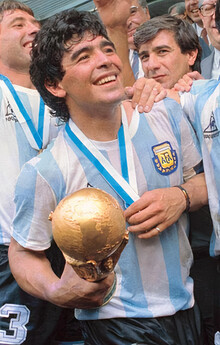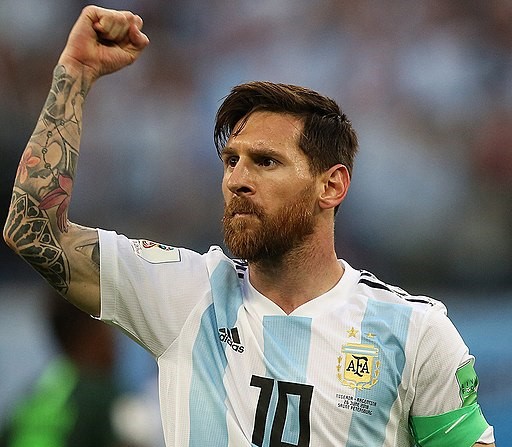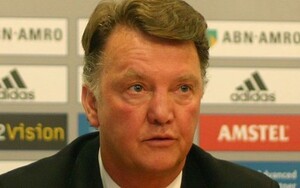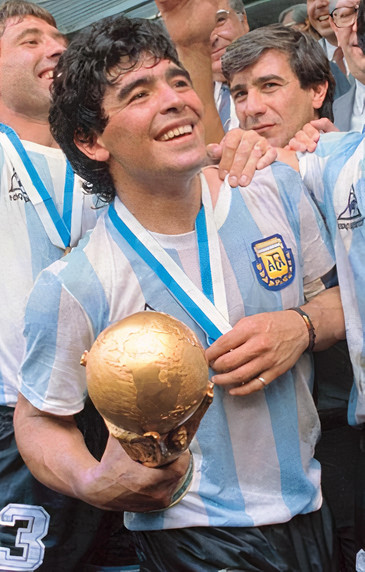As Argentina prepare to take on France in the 2022 Qatar World Cup final, the Albiceleste captain Lionel Messi has the opportunity to claim the one prize that’s missing from his mantelpiece, and emulate the man whose trail he has been touted to follow all his career: Diego Maradona.
Regardless of the result of Sunday’s final however, Messi’s Argentina have already emulated the ‘El Pibe de Oro’ (The Golden Kid) in many important ways. Let’s look at how they have achieved the same in 3 simple words.
1) FUORICLASSI
“I was trying to defend a group of players that was not fuoriclassi – not out of this world – but who would never stop working hard. They were the ones who had come all that way fighting any way they could, and now the moment of truth had arrived.”
– Diego Maradona in El Diego, his autobiography

Diego Maradona wrote those words when looking back at the run up to the 1986 World Cup in Mexico. Maradona was then holding consultations with Carlos Bilardo, the Argentina coach, on who would make the final cut to travel to Mexico and play in the World Cup. “I backed the ones who had already been playing in the squad because they had taken a lot of shit, too much,” wrote Maradona. Players like Pedro Pasculli, Ricardo Gareca, Jorge Valdano and Jorge Burruchaga.
“I wanted Bilardo to respect them as men, rather than just as players,” he wrote.
In the end, Bilardo ended up excluding almost an equal number of players that Maradona recommended from the World Cup squad that he included.
Maradona’s description of his teammates at the 1986 World Cup – not fuoriclassi – can easily be used to describe Argentina’s Class of 2022 in Qatar. Besides Lionel Messi, the current Albiceleste squad does not have the starpower of previous years.
They don’t have a Claudio Caniggia in his prime who can leave his markers eating his dust; a great centre forward like Gabriel Batistuta who Maradona called “an animal. An animal who, thank God, he’s Argentinean”; an Ariel Ortega who can leave even the most accomplished defenders looking like putzes as he dribbles past them; a Juan Roman Riquelme, who seemed to have a satnav in his right foot; a Pablo Aimar, whose ability to play killer passes and glide past opposition defences made him Messi’s idol; or a Sergio Aguero, a complete forward who could create as well as finish goal scoring chances.
This is not to say that Argentina, Messi apart, do not have a lick of genius today. There are just not as plentiful as there were in the past.
Besides Messi, the Albiceleste have Angel Di Maria and Lautaro Martinez, with Di Maria recently losing his spot in the starting 11 due to injury and Martinez losing his due to poor form.
They also have Paulo Dybala, who played briefly and impressed against Croatia in the semifinal but is yet to fully recover from injury.
All of Argentina’s other players in Qatar are solid, if unspectacular.
Not that Maradona would mind, however. One suspects that as long as the Albiceleste display a healthy dose of ‘Bronca’ (the spirit of resistance), the Argentine titan would be satisfied.
2) BRONCA

Thousands of feet above the ground, Carlos Bilardo got up from his seat on the flight to Rome and faced his Argentina squad. The Albiceleste coach and his wards were on their way back to their base in Rome from Milan in June 1990, just after losing their opening match of the World Cup to Cameroon 0-1.
“Lads, there are two possible outcomes after what happened here,” said Bilardo. “Either we reach the final, or may the plane carrying us back to Argentina fall out of the sky.”
The coach’s words were angrily interrupted by Maradona, Argentina’s captain. “Bilardo, you fucking motherfucker! May the plane not fall out of the fucking sky! Let’s make it to the final.”
Maradona, recounting this story in his autobiography ‘El Diego’, dug deep into what he calls “bronca”, a kind of siege mentality that pit him and his team on the one side and the rest of the world on the other, and inspired Argentina to a second successive World Cup final appearance.
“To play against everything and against everyone was my speciality,” he would write.
More than 3 decades later, Lionel Messi emulated Maradona by helping Argentina recover from a loss in their opening match of a World Cup to reach the final. “I think among ourselves we were too confident back then, because we knew our potential as a group, and we lost the first match in the fine margins,” said the Argentina captain about the Albiceleste’s shock 1-2 defeat to Saudi Arabia in their opening match of the 2022 World Cup.
“That helped us grow as a team and advance in the championship,” said Messi, who has been in stellar form during the tournament, scoring 5 goals and recording 3 assists in Argentina’s run to the final.
3) LAVATEVI!

As soon as the penalty went in, the players clad in azure bibs took off from the dugout and headed for the away stand. They celebrated vociferously in front of the Hellas Verona fans present there. “That’s what we were like, that’s what the team was like, and that’s what the city was like,” wrote Maradona. “They were in your face.”
It was February 23, 1986. Maradona had just scored his second goal of the day to help Napoli recover from 0-2 down to salvage a 2-2 draw against Verona in a Serie A match. “We celebrated as if we’d won the Scudetto!” he wrote.
The reason behind Napoli’s feverish celebrations lay with the Verona fans themselves: during the game, the fans in the away stand had been shouting “Lavatevi! Lavatevi!” (Wash yourselves! Wash yourselves!). It was the kind of racism that Napoli, a team from the less prosperous southern part of Italy, had become sadly well accustomed to whenever they played teams from the more well off northern parts of Italy. Verona were no exception.
On December 10, 2022, 36 years after Maradona’s Napoli had proven a point against Verona, a similar episode played out in Qatar. After Lautaro Martinez sunk his penalty kick to take Argentina into the World Cup semifinals against Croatia, Albiceleste players clad in Argentina’s famous blue and white jersey streamed past their Dutch rivals mocking and taunting them in their hour of defeat.
I feel disrespected by Van Gaal after his pre-game comments and some Dutch players spoke too much during the game.
Lionel Messi, after the Argentina-Netherlands quarter-final
Widely slammed in the media over a perceived lack of sporting spirit, Argentina centre-back Nicolas Otamendi explained, “I celebrated in the face because there was a player from the Netherlands who, in every penalty we had, came and said things to one of our players.”
Messi, too, explained why he had resorted to a provocative celebration of cupping his ears with his hands in the direction of Holland coach Louis Van Gaal after scoring Argentina’s second goal during the match.
“Van Gaal says that they play good football, but what he did was put on tall people and hit long balls,” said Messi.
“I feel disrespected by Van Gaal after his pre-game comments and some Dutch players spoke too much during the game,” he said.
“Messi is (Argentina’s) most dangerous creative player, he is able to create a lot and to score goals himself,” Van Gaal had said before the quarter-final clash. “But when they lose the ball and the opponent has possession he doesn’t participate much, and this gives us chances (to exploit).”
Maradona, who managed Messi during the 2010 World Cup as Argentina coach, once called Messi a “good person,” but added that “he has no personality.”
“He doesn’t have the personality to be a leader,” he told Brazilian legend Pele at an event in 2016.
Regardless of the outcome of Sunday’s final, Lionel Messi has done enough to prove himself as Argentina’s undisputed leader at this World Cup.

